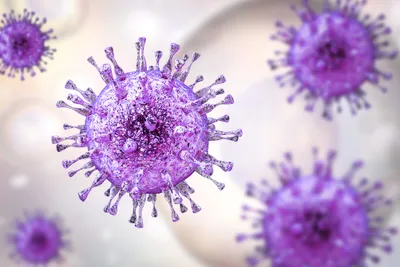You probably don’t think of herpes being a child’s health problem, but there exists a children’s disease that is sparked by the same virus. Cytomegalovirus (CMV) can infect “almost anyone” and the virus will stay with you for life, even if there are no symptoms (which is common in otherwise healthy people, says the Mayo Clinic).
CMV can make it to a baby through breast milk, which isn’t usually a danger to the child. However, an expectant mother with the viral symptoms can infect the newborn. Children and teenagers can have symptoms that can be mistaken for another illness. Here are six things to know about this virus…
1. Cytomegalovirus is the Most Common Congenital Infection
According to HealthyChildren.org, cytomegalovirus (or CMV) is the most prevalent virus at birth from infected mothers in the U.S. As mentioned before, babies can get the virus through breast milk, but there are other ways junior can wind up with the problem.
The source notes unborn babies can get CMV through the placenta, the source of nourishment for the fetus. Babies can also contract the virus during delivery from an infected genital tract, adds the source. Just how common is CMV? One source, Medscape, notes, “At least 60-percent of the US population has been exposed to CMV, with a prevalence of more than 90-percent in high-risk groups.”
2. Symptoms are Usually Mild
KidsHealth.org explains that symptoms for children aren’t usually alarming, although can vary from child to child “depending on the age and health of a child, and the number of times a child has had it.”
In babies, this can mean low birth weight, jaundice, or an enlarged spleen in relatively rare cases, while in older children and teens, you might notice “mono-like” symptoms from fatigue, fever, muscle aches and enlarged liver or spleen, adds the source. The symptoms usually only persist in children for 3-weeks at the most.
3. There are Other Ways to Contract Cytomegalovirus
While babies can get CMV from their mother, older kids and teens can get it from other sources. Centers for Disease Control and Prevention (CDC) note that major sources of the virus include saliva, blood, and tears.
Teenagers experimenting with kissing (or more) may also inadvertently pass along the virus. Infected children may also easily pass the virus to you as a parent, so be sure to wash your hands often, especially after changing a diaper.
4. Cytomegalovirus Can Overcome a Weak Immune System
If your child has a compromised immune system for any reason, the symptoms could be worse news. While we mentioned some of the common (milder) symptoms earlier, MedicinePlus.gov notes other negative effects of the virus such as chest pain, hives, and even irregular heartbeat.
Worse yet, the source says this virus (that usually affects 10 to 35-year olds in the U.S.) can cause shortness of breath, increased heart rate, and neck stiffness. People who have had bone marrow or organ transplants are especially at risk, and in these cases CMV can even be fatal. If you contracted CMV as a healthy person, it can reactivate if your immune system is weakened.
5. Cytomegalovirus Isn’t Always Treated
The Merck Manual explains that “mild” versions of CMV aren’t often treated, and are expected to subside on their own. However, when the virus is causing more severe symptoms that can be life-threatening, antiviral drugs can be prescribed.
These drugs include valganciclovir, ganciclovir, cidofovir, and foscarnet, and can all have “serious side effects,” according to the source. However, in some cases side effects are much better than the alternative, which is a loss of life or even eyesight, in the manual’s example.
6. CMV Can Survive Outside a Host
While there’s a risk of contracting CMV from another person, a child (or adult) can also pick it up from an inanimate object, warns the Public Health Agency of Canada. The source notes this virus can live for up to 7-days on dry surfaces.
Aside from that, CMV can live on a blanket for 2-hours, and on plexiglass for up to 8-hours, adds the source. “Physical inactivation” can occur when the virus is exposed to heat (132F for 30-minutes or more) or from UV light or from freezing/thawing cycles. It can also be rendered harmless by certain disinfectants.









